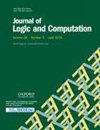玻尔兹曼神经网络中的超经典逻辑建模:III自适应
IF 0.7
4区 数学
Q3 COMPUTER SCIENCE, THEORY & METHODS
引用次数: 0
摘要
逻辑中的信念修正领域仍处于不断发展的过程中,存在着各种不同的方法;理论推测的结果。玻尔兹曼机作为超经典非单调(SCNM)逻辑的概率模型,提供了一个进入该领域的实验门户。玻尔兹曼网络如何适应新的信息?灾难性遗忘是任何神经网络对再训练的默认反应。我们通过改变玻尔兹曼学习算法缓和了这种非理性的非单调性。实验信念变化的频谱受到“新”信息的可用性的限制,这是一种与SCNM逻辑领域的理性单调性特性相关的实用实现。认识到可否定信念的上边界简化了实验探索机器自适应的任务。少数信念修正涉及新的,但不令人惊讶的信息,至少部分与先前学到的信念一致。在这种情况下,Boltzmann网络根据偏好增量调整模型状态样本的优先级;SCNM逻辑中的传统方法。然而,在大多数情况下,新的信息将与先前的信念惊人地不一致。在这些情况下,按首选项分层的模型状态的预排序将没有足够的粒度来表示基于组合原子典型性的排序的冲突需求。这一新颖的实验发现在以前的信念修正逻辑猜想中没有被考虑到。本文章由计算机程序翻译,如有差异,请以英文原文为准。
Modelling supra-classical logic in a Boltzmann neural network: III adaptation
Abstract The field of belief revision in logic is still in evolution and holds a variety of disparate approaches; a consequence of theoretical conjecture. As a probabilistic model of supra-classical, non-monotonic (SCNM) logic, the Boltzmann machine, offers an experimental gateway into the field. How does the Boltzmann network adapt to new information? Catastrophic forgetting is the default response to retraining in any neural network. We have moderated this irrational non-monotonicity by alterations in the Boltzmann learning algorithm. The spectrum of experimental belief change is limited by the availability of ‘new’ information, a pragmatic realization co-related to the property of Rational Monotonicity in the domain of SCNM logic. Recognizing this upper boundary of defeasible belief simplifies the task of experimentally exploring machine adaptation. A minority of belief revisions involve new, but unsurprising information, that is at least partially consistent with the previous learned beliefs. In these circumstances, the Boltzmann network incrementally adjusts the priority of model state exemplars in accordance with preference; the traditional approach in SCNM logic. However, in the majority of situations the new information will be surprisingly inconsistent with the previous beliefs. In these circumstances, the pre-order on model states stratified by preference, will not have sufficient granularity to represent the conflicting requirements of ranking based on compositional atomic typicality. This novel experimental finding has not previously been considered in the logical conjecture on Belief Revision.
求助全文
通过发布文献求助,成功后即可免费获取论文全文。
去求助
来源期刊

Journal of Logic and Computation
工程技术-计算机:理论方法
CiteScore
1.90
自引率
14.30%
发文量
82
审稿时长
6-12 weeks
期刊介绍:
Logic has found application in virtually all aspects of Information Technology, from software engineering and hardware to programming and artificial intelligence. Indeed, logic, artificial intelligence and theoretical computing are influencing each other to the extent that a new interdisciplinary area of Logic and Computation is emerging.
The Journal of Logic and Computation aims to promote the growth of logic and computing, including, among others, the following areas of interest: Logical Systems, such as classical and non-classical logic, constructive logic, categorical logic, modal logic, type theory, feasible maths.... Logical issues in logic programming, knowledge-based systems and automated reasoning; logical issues in knowledge representation, such as non-monotonic reasoning and systems of knowledge and belief; logics and semantics of programming; specification and verification of programs and systems; applications of logic in hardware and VLSI, natural language, concurrent computation, planning, and databases. The bulk of the content is technical scientific papers, although letters, reviews, and discussions, as well as relevant conference reviews, are included.
 求助内容:
求助内容: 应助结果提醒方式:
应助结果提醒方式:


